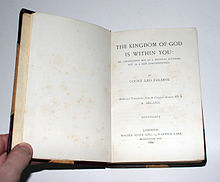The Kingdom of God Is Within You

The 1st English edition of The Kingdom of God Is Within You.
|
|
| Author | Leo Tolstoy |
|---|---|
| Country | Russia (written)/Germany (first published) |
| Language | Russian |
| Subject | Christian theology, philosophy, anarchism |
| Published | 1894 |
| Media type | Hardcover, Paperback |
| Pages | 335 pages (1927 edition, hardcover) |
| ISBN | |
The Kingdom of God Is Within You (Russian: Царство Божие внутри вас [Tsarstvo Bozhiye vnutri vas]) is a non-fiction book written by Leo Tolstoy. A philosophical treatise, the book was first published in Germany in 1894 after being banned in his home country of Russia. It is the culmination of thirty years of Tolstoy's thinking, and lays out a new organization for society based on a literal Christian interpretation.
The Kingdom of God is Within You is a key text for Tolstoyan, nonviolent resistance, and Christian anarchist movements.
The title of the book is taken from Luke 17:21. In the book Tolstoy speaks of the principle of nonviolent resistance when confronted by violence, as taught by Jesus Christ. When Christ says to turn the other cheek, Tolstoy asserts that Christ means to abolish violence, even the defensive kind, and to give up revenge. Tolstoy rejects the interpretation of Roman and medieval scholars who attempted to limit its scope.
“How can you kill people, when it is written in God’s commandment: ‘Thou shalt not murder’?”
Tolstoy took the viewpoint that all governments who waged war are an affront to Christian principles. As the Russian Orthodox Church was—at the time—an organization merged with the Russian state and fully supporting state's policy, Tolstoy sought to separate its teachings from what he believed to be the true gospel of Christ, specifically the Sermon on the Mount.
Tolstoy advocated nonviolence as a solution to nationalist woes and as a means for seeing the hypocrisy of the church. In reading Jesus' words in the Gospels, Tolstoy notes that the modern church is a heretical creation:
“Nowhere nor in anything, except in the assertion of the Church, can we find that God or Christ founded anything like what churchmen understand by the Church.”
...
Wikipedia
